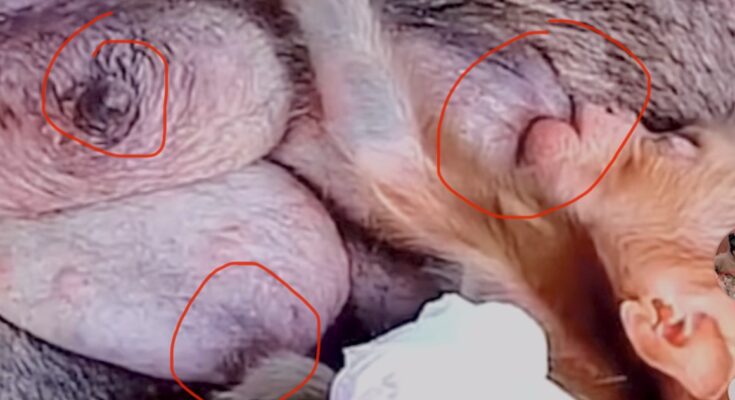In a small forest reserve on the outskirts of a rural village, a heart-wrenching yet hopeful story unfolded—a baby monkey was recently rescued from a cruel poacher’s trap, highlighting both the dangers wildlife face and the crucial role of community vigilance and conservation.
The young monkey, estimated to be just a few months old, was found entangled in a crude wire snare—an illegal trap often set by poachers to capture animals for the exotic pet trade or bushmeat. The snare was hidden under leaves near a popular animal trail, a method commonly used to avoid detection by authorities. Fortunately, local forest rangers, who had been patrolling the area following reports of increased illegal activity, discovered the injured animal in time.
Weak, dehydrated, and in visible distress, the baby monkey was immediately rushed to a nearby wildlife rehabilitation center. Veterinarians there treated deep wounds on its leg, likely caused by struggling to escape the trap. “The injuries were severe, but not life-threatening thanks to early intervention,” said Dr. Aruna Malik, the lead vet at the center. “With proper care, we expect a full recovery.”
What makes this story even more inspiring is the role played by a group of local children. While exploring the forest trail, they noticed unusual movement and faint cries near the underbrush. Instead of ignoring it, they alerted their teacher, who then contacted the local wildlife authorities. Their quick thinking and compassion helped save a life and may have prevented more animals from suffering the same fate.
“This rescue is not just about one monkey—it’s about raising awareness,” said Rajan Singh, a wildlife officer involved in the mission. “Every trap we find and every animal we save is a step closer to protecting our forests from poachers.”
The incident has sparked conversations in the community about the growing threat of illegal wildlife activities. In many areas, habitat loss and poaching continue to endanger not only monkeys but a wide range of species. Organizations working in the region are now conducting workshops and school programs to educate the public, especially young people, on how to identify and report signs of poaching.
As for the baby monkey, affectionately named “Mowgli” by the rescue team, its journey to recovery is ongoing. After weeks of medical treatment, Mowgli has started to regain strength and is learning to climb again. Once fully rehabilitated, conservationists plan to reintroduce the monkey into a protected area where it can live freely and safely.
Stories like Mowgli’s remind us that every small act of kindness matters. Whether it’s reporting suspicious activity, supporting wildlife rescue groups, or simply educating others, we all have a role to play in preserving the planet’s incredible biodiversity.



